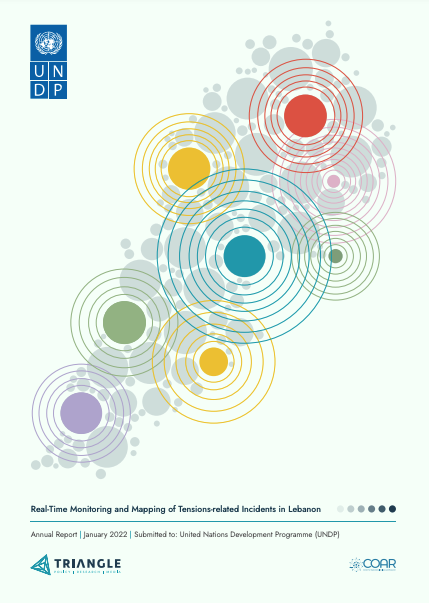Lebanon has experienced a significant increase in intra-communal tensions. Historically, Lebanese communities coexisted relatively peacefully, but this dynamic has shifted dramatically. By August 2021, 31 percent of Lebanese reported negative relations between different communities, up from just 4 percent in 2018. These rising tensions have culminated in numerous incidents across the country. To better understand and address this issue, the United Nations Development Programme (UNDP) collaborated with Triangle and its partner COAR to implement a comprehensive real-time monitoring and mapping system for intra-Lebanese tensions. This initiative aims to provide in-depth analysis and insights to inform national and local decisions on prevention and mitigation measures.
Triangle’s latest report offers a thorough analysis of incidents recorded from December 2020 to October 2021. Utilizing a robust methodological framework, the project combines quantitative data collection with qualitative analysis, supported by interviews and triangulation of various sources. The analysis reveals that Lebanon faced 9,214 recorded incidents during the reporting period. The primary drivers of these tensions include insecurity and lack of rule of law, discontent with state institutions and political establishments, economic deterioration, and reduced provision of services. Community insecurity emerged as the most significant source of tension, characterized by incidents of theft, armed clashes, and the formation of community watch groups. Political discontent also contributed significantly, with numerous roadblocks and demonstrations reflecting widespread dissatisfaction with state institutions. Economic hardships, particularly related to the lifting of fuel subsidies, further exacerbated tensions, while service-related issues, such as prolonged electricity cuts, compounded the problem. Geographically, the North governorate experienced the highest concentration of incidents, followed by Mount Lebanon and the South governorate. The report underscores the urgent need for proactive measures to prevent and mitigate rising intra-communal tensions as Lebanon’s socio-economic situation continues to deteriorate.
